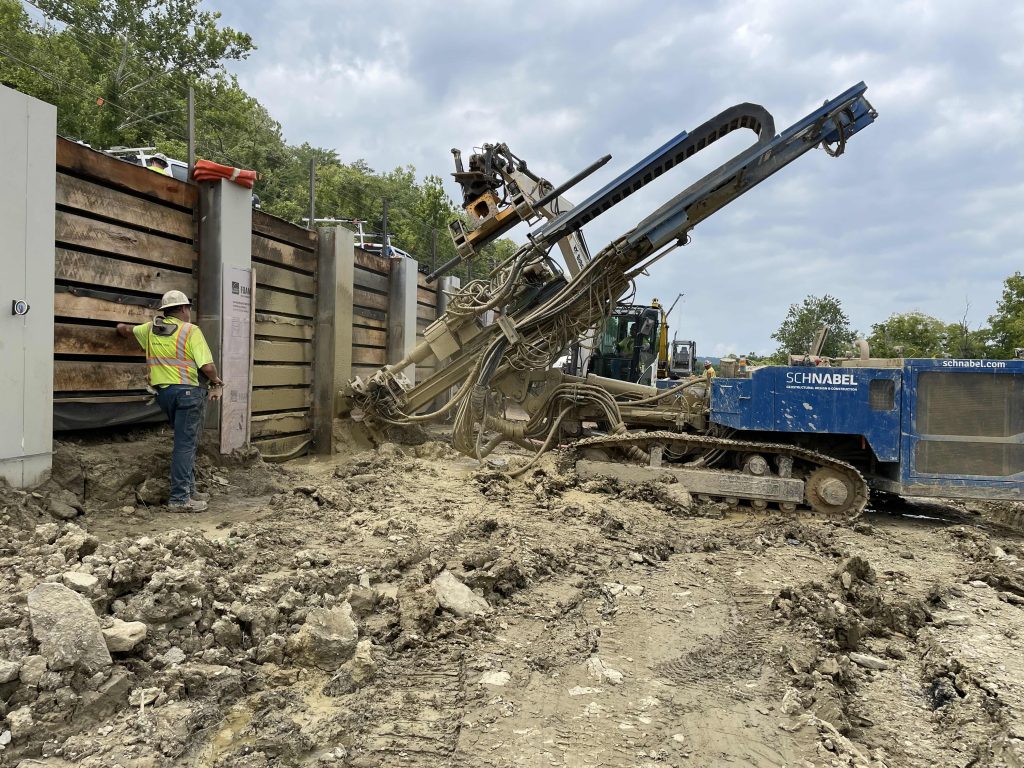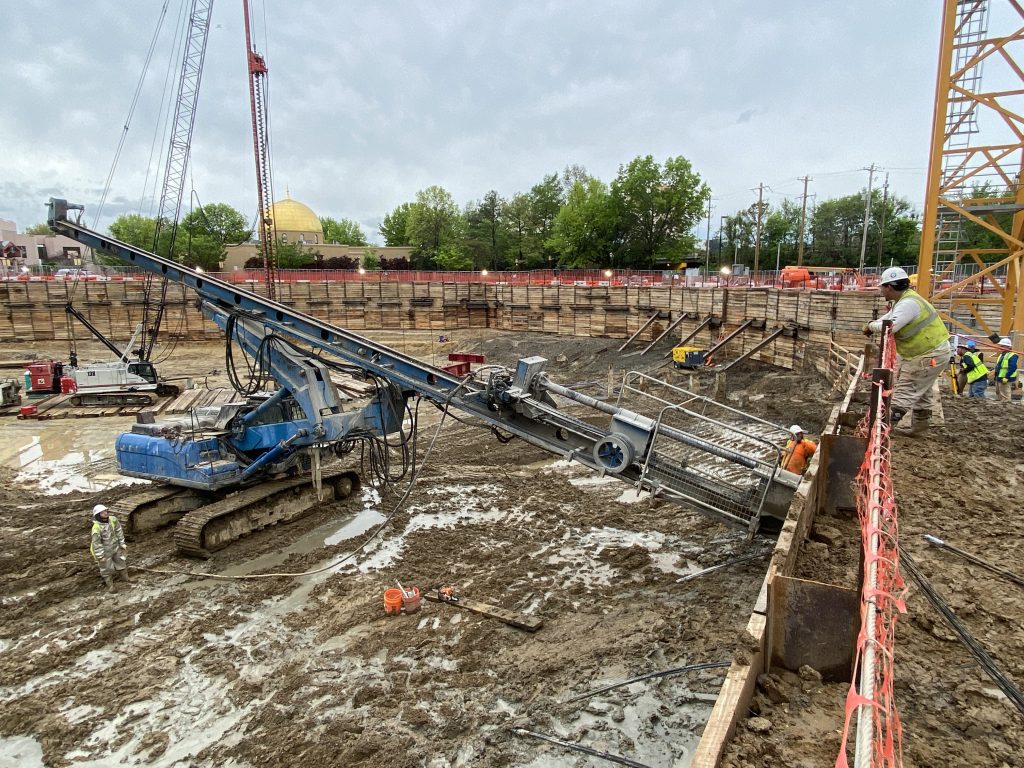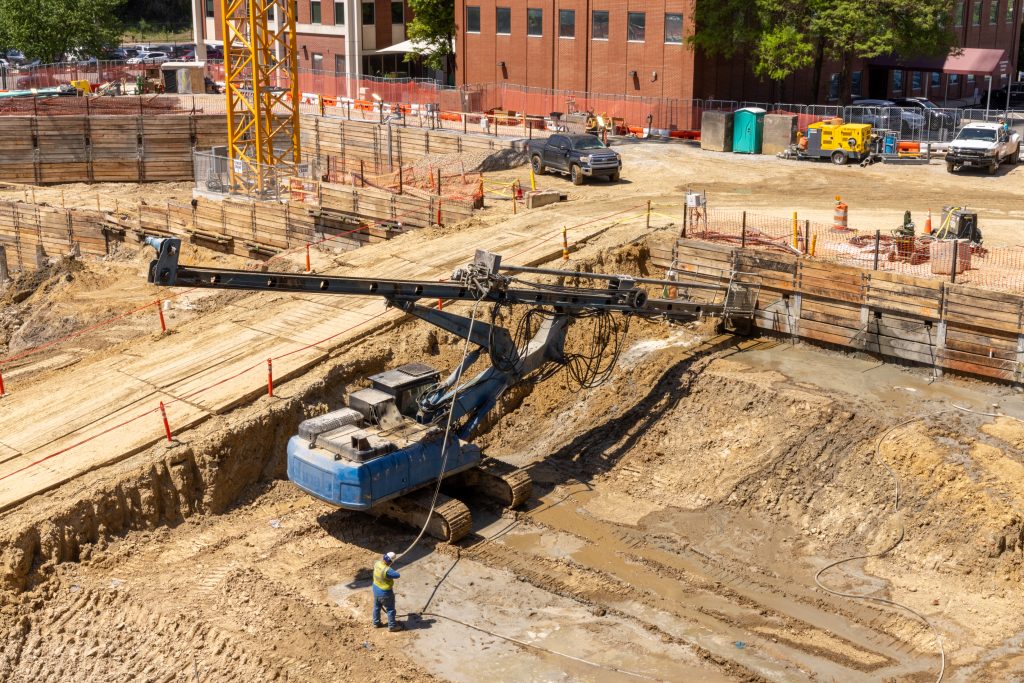Reliable Tieback Solutions for Excavation Support & Anchored Retaining Walls
Proven Lateral Resistance for Safe, Stable, and Long-Lasting Retaining Structures.
As one of America’s most accomplished design-build contractors, Schnabel delivers dependable excavation support systems and anchored retaining walls using advanced tieback technology.
Tiebacks provide the lateral resisting force that stabilizes excavations and retaining structures, keeping projects safe, efficient, and on schedule.
How Tiebacks Work
Tiebacks are used to provide the lateral resisting force for many of the excavation support systems and anchored retaining walls that Schnabel builds. They are constructed by grouting a high strength steel bar or strand bundle into the soil or rock behind the failure surface of the retaining wall. After the grout has cured, every tieback is tested, and the load is locked in to limit movement.
In addition to their use in the construction of new retaining structures, tiebacks are also used to stabilize existing anchored retaining walls that are moving or deteriorating. Schnabel has patented systems for the tieback connections and facings used for the repair of distressed MSE, Bin and cantilevered retaining walls and has specialized equipment for drilling tiebacks through failing bulkheads along the waterfront. Tiebacks are also used to stabilize landslides where the tieback can be anchored in the soil or rock below the slide failure plane.
Tiebacks can be used for both temporary and permanent applications. Permanent tiebacks differ from temporary tiebacks in that the critical components of the tieback tendon and anchor head are protected from corrosion. Tie back construction can be anchored into most types of soil and rock. The capacity of the anchors in soil will vary depending upon soil type and installation method. Denser, granular soils will typically produce higher capacity tiebacks. Schnabel has installed tiebacks with lengths in excess of 200 feet and tested capacities of over 500 kips.
Tieback Solutions

New Excavation Support Systems
Providing reliable lateral force to ensure wall stability.

Stabilizing Existing Walls
Restoring and reinforcing deteriorating anchored retaining walls.

Waterfront Structures
Specialized equipment for drilling tiebacks through failing bulkheads.

Landslide Stabilization
Anchoring into stable soil or rock below the slide plane.

Permanent and Temporary Applications
With corrosion-protected tendons for long-term performance.

Tiedowns
A variation designed to resist hydrostatic uplift, seismic loads, and wind-related uplift.

Why Schnabel?
With decades of expertise in tieback construction, Schnabel combines engineering excellence with practical field experience to deliver solutions that perform reliably over the long term.
Here’s why clients trust Schnabel for their tieback needs:
Partner with Schnabel to ensure your project is supported by proven tieback solutions built to last.
Real-World Results in Tiebacks
Projects Schnabel Has Worked On
Here are some of tieback projects where Schnabel’s solutions played a critical role:

St. Jude Outpatient Clinic & Clinical Building
Location:
Memphis, TN
Client:
Flintco LLC
Background
Flintco LLC contracted Schnabel to design and construct the shoring required for two 15-story buildings, ensuring safe excavation adjacent to sensitive structures.
Schnabel’s Solution
The shoring system consisted of approximately 3,000 linear feet of excavation support, ranging in height from 15 to 29 feet. The design incorporated 311 soldier beams, 236 tiebacks, and roughly 50,000 square feet of wood lagging.
Results
The excavation support was successfully implemented, allowing safe construction of both buildings without disruption to adjacent areas.

Red Rock Hydroelectric
Facility
Location:
Des Moines, IA
Client:
Ames Construction
Background
Schnabel was contracted as the Tieback Anchor Contractor for this award-winning project, which required constructing a new powerhouse on an existing flood control dam.
Schnabel’s Solution
A total of 153 post-tensioned tieback rock anchors, up to 173 feet long, were installed to support a large 60-foot-tall temporary secant pile wall positioned above a 40-foot-tall rock cut.
Results
The tieback system successfully stabilized the excavation, allowing safe construction of the powerhouse while maintaining structural integrity of the dam.


